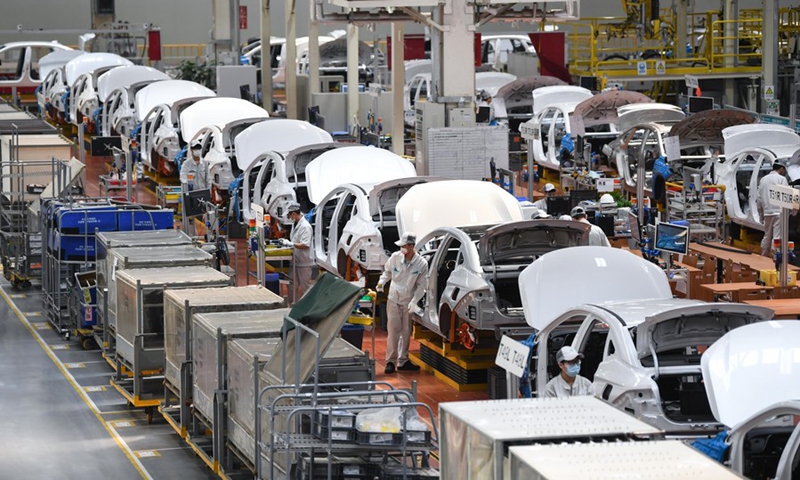China’s NEV sector off to strong start in first quarter

This photo taken on Feb 24, 2023 shows the assembly line of GAC Aion, an NEV subsidiary of Guangzhou Automobile Group Co., Ltd. (GAC Group), in Guangzhou, south China's Guangdong Province. Photo: Xinhua
A number of Chinese new-energy vehicle (NEV) brands saw their shares continue to rise on both US and Chinese bourses on Tuesday after they posted strong sales figures for March.
Chinese experts believed that the strong sales performance of some leading NEV brands in March reflected the strong momentum in the further upgrading of China's manufacturing industry. The strong exports performance, despite headwinds, also reflected the competitiveness of Chinese NEVs, they noted.
Private enterprises continue to demonstrate their innovative capability, reflecting the resilience of the Chinese economy and recovering confidence of private enterprises, analysts pointed out.
Looking forward, experts believe that China's NEV sales will continue to post strong gains, with an expected high growth rate of around 20 percent in the first half of the year.
BYD, China's biggest electric vehicle (EV) maker, reported a 46.1 percent year-on-year rise in its March sales on Monday with 302,459 units sold. For the first quarter, the company sold 626,263 NEVs, up 13.44 percent.
China EV makers Nio, Li Auto and XPeng also reported March and first-quarter deliveries on Monday, meeting or just exceeding low expectations, according to media reports.
The strong sales posted by these brands were accompanied by news of the impressive entrance into the market by new brands such as Chinese smartphone and electronics maker Xiaomi.
The company, having debuted its SU7 electric car last week, now had bookings reaching 40,000 units, with backlog orders piled up for as long as eight months, according to media reports on Tuesday.
Under the spotlight of investors and global media outlets, the robust booking data send the company's shares up 8.97 percent to 16.28 Hong Kong dollars ($2.08) per share at the Hong Kong bourse on Tuesday. Xiaomi's market value during intraday trading once reached $7.6 billion, surpassing both GM and Ford, according to Reuters.
Some observers hailed Xiaomi's successful debut into an already crowded scene featuring fierce competition as one more example of the daring entrepreneurial spirit of the Chinese private sector companies and a demonstration of recovering confidence by private companies.
The China Passenger Car Association (CPCA) said on Tuesday that it expects NEV sales to top 820,000 units in March, an increase of 33 percent year-on-year. Month-on-month, the increase is equal to 84 percent.
According to estimates by a CPCA executive, China's NEV sales accounted for 62 percent of global NEV sales in January and February, the Securities Times reported.
"As one of the tech-intensive and green 'new three' items, the robust growth of the NEV sector is an indication that the Chinese economy is off to a good start in the first quarter," Li Chang'an, a professor at the Academy of China Open Economy Studies of the University of International Business and Economics, told the Global Times on Tuesday.
In a sign of a further recovery in manufacturing activity, China's official manufacturing purchasing managers' index returned to expansion range with a reading of 50.8 in March after running below 50 for five consecutive months, data from the National Bureau of Statistics showed on Sunday.
"The stellar performance of the sector signals China's global competitiveness when it comes to technology and innovation has further strengthened amid the nation's broader plan to develop new quality productive forces," Li said.
"China's NEV market is a highly competitive sector and the performance by leading NEV brands underlined the resilience of China's industrial upgrade," Wu Shuocheng, a veteran automobile analyst, told the Global Times on Tuesday.
"Against protectionist headwinds in some markets, the competitiveness of Chinese companies remained strong," Wu said.
As the Chinese economy continues to recover, Wu expected NEV sales to register a 20 percent year-on-year growth for the first half of the year with overall sales of passenger vehicles growing by around 5 percent.
Analysts also urged the US and the EU to stop their crackdown tactics against China's new-energy industry, including the NEV sector, as Chinese NEVs are a contributing, not an undermining, factor for their climate goals.
Protectionist measures taken against Chinese EVs will not improve their competitiveness for their respective auto industries and will undermine their efforts in realizing climate goals, Li said, noting that the noises of decoupling on NEV could not obstruct the rise of Chinese NEV, which is driven by market competition, devotion to innovation and supply chain advantage.
The US and the EU should seek cooperation with China on NEVs so as to tap the great complementarities, rather than taking a protectionist path, analysts said.
Photos
 Tourist-dedicated New Orient Express gears up to offer luxury train travel around NW China's Xinjiang
Tourist-dedicated New Orient Express gears up to offer luxury train travel around NW China's Xinjiang Spectacular sea of blooming rapeseed flowers attracts tourists to Yueqing, E China's Zhejiang
Spectacular sea of blooming rapeseed flowers attracts tourists to Yueqing, E China's Zhejiang Rare bird species spotted in north China's grassland
Rare bird species spotted in north China's grassland Formerly polluted Yundang Lake transforms into natural haven in Xiamen, SE China
Formerly polluted Yundang Lake transforms into natural haven in Xiamen, SE China
Related Stories
- China's Xiaomi releases its first self-developed NEV
- China to consolidate leading position in intelligent connected new-energy vehicles: report
- China's energy transition fueling green productive forces
- China to further enhance NEV charging facilities
- China localities turn to new productive forces for growth momentum
- German engineers witness growing Sino-German collaboration on NEVs
- Global luxury electric vehicle maker upbeat on China's high-end NEV market potential
- Jilin Province aims to build over 120,000 NEV charging poles by 2025
- Ensuring care-free NEV rides during Spring Festival travel rush
- China dominates global new energy car sales
Copyright © 2024 People's Daily Online. All Rights Reserved.





